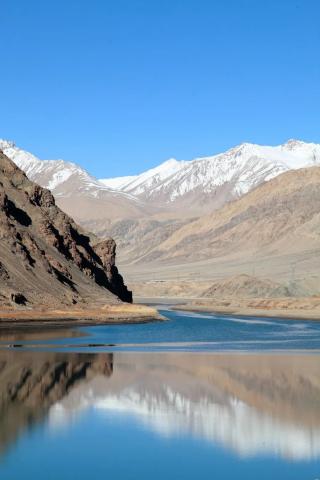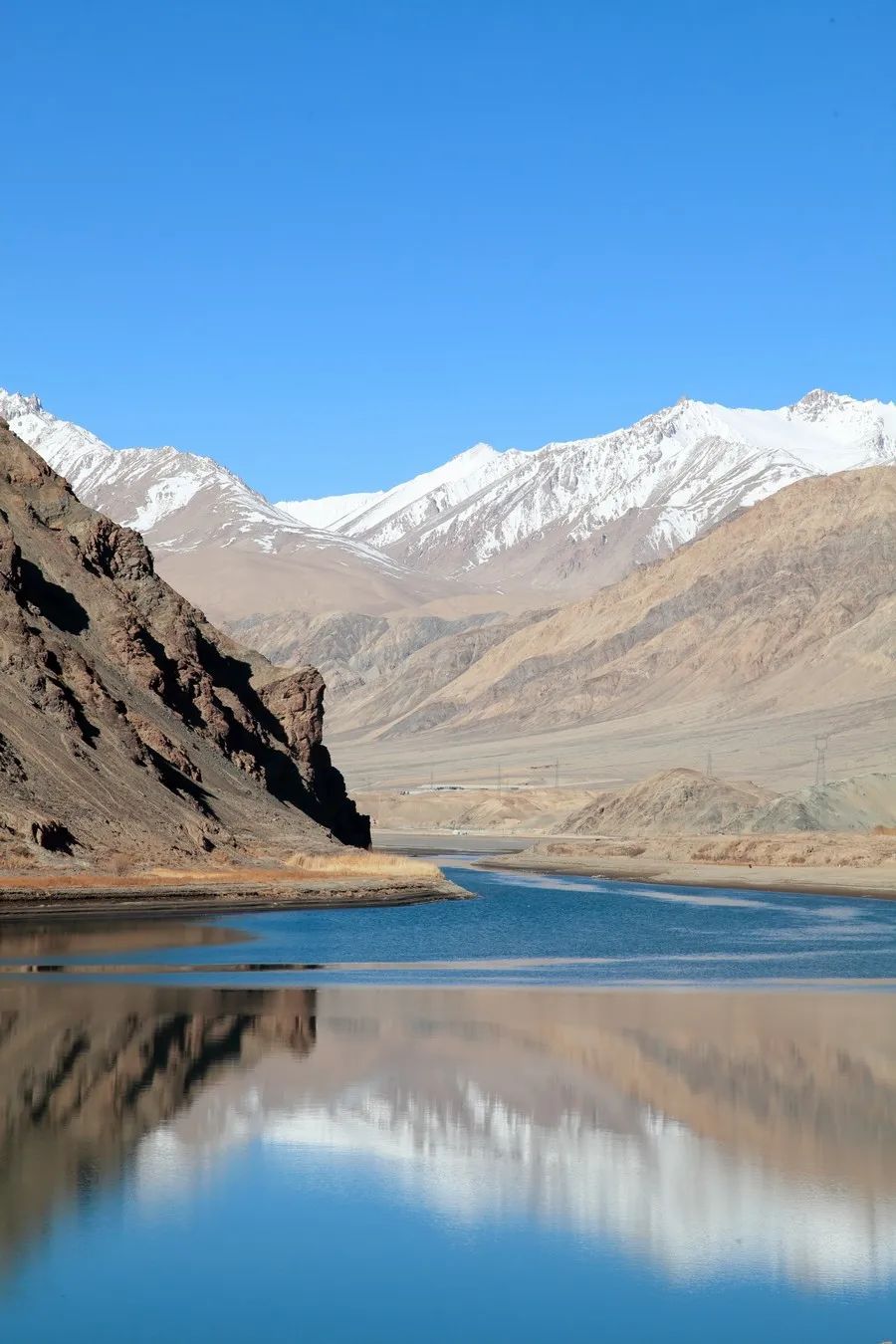

The summer in Guangzhou is like a steamer, humid and hot, and people in it are like trapped animals, like fish without water, dying. Occasionally, I recall my trip to southern Xinjiang more than a month ago, as if it was a dream.
At the end of April, we set off from the ancient city of Kashgar and headed to Taxkorgan via National Highway 314.
There are densely packed snow-capped mountains for hundreds of kilometers along the way. Later I learned that we had been traveling around Mt. Mustagh Peak with an altitude of 7509 and Gonggeer Jiubie Peak with an altitude of 7530. What we saw were their countless faces and profiles. It was a magical experience. I've met the same person countless times and I don't even recognize him.
It wasn’t until the last day when we returned to Kashgar from Taxkorgan that we became familiar with these old friends.
There is also K2 not far away, commonly known as K2, with an altitude of 8611 meters, the second highest peak in the world.


There were very few cars along the way, but we were not alone. Perhaps it was because we were surrounded by snowy peaks. The road was neat and flat, and even turning would not cause discomfort. Unknowingly, we climbed all the way.
Master Wu, who accompanied us for three days, sometimes reminded us to pay attention to the old road. He said that the old road was very interesting to walk, but the new road lost some of the fun of off-roading.
We always think that the mountains have always been there and the water has always been there. They remain unchanged forever. In fact, each of us remembers the place differently. Even if we visit at the same time, our impressions may be completely different.
The kind of travel I like is the kind that can be reached repeatedly, sometimes based on memory, sometimes returning to the same place again and again to discover, correct, and integrate. Those destinations that I am lucky enough to travel back and forth to many times are all my hometowns.
Master Wu is a native of Yichang and has been working and living in Xinjiang for many years. In addition to his livelihood, he chose Xinjiang because of his curiosity, love and pride for a place.
He always took the trouble to stay and wait for us, and I am very grateful to this day when I think about it. Without him, we might not have seen the most beautiful part of the Pamirs, nor would we have gotten to know the "Tajik Bride" family.


"Tajik Bride" and her grandson in Jin Shangyi's painting
The day before our trip, my companion and I drank a cup of coffee in the ancient city of Kashgar. We went to an Internet celebrity "Old Town Corner Cafe" started by local youths. On the second floor of the cafe, there were several groups of travel photographers working at the same time. Different girls, the same The corners and angles, the same local costumes, the same flower hats.
Guests on the first and second floors, taking photos, partying, etc., everyone does not disturb each other, and they do not look at each other. My companion is used to a cup of coffee every day, so she ordered a latte and I ordered a cup of almond coffee. She also complained that the coffee flavor was not strong enough. As a result, we were all overwhelmed by this cup of "Western Coffee" and spent the whole night tossing and turning, unable to sleep.
In addition to continuous insomnia, I also had to endure the swelling and pain in my eyes that started before departure.
If sleep is important, be sure to control your mouth and avoid drinking coffee, black tea, or milk tea.

After arriving in Taxkorgan, I continued to have insomnia. This time, there was no coffee, just a pot of mellow milk tea from Kaner Township, and a big, round bright moon. When I woke up and opened the curtains, the moon was like a bright light, illuminating the snowy peaks and mountains. The reflection of the earth was clear and clear, and I was stunned for a while, quietly feeling what it meant to be reduced to the end of the world, thinking about my thoughts for a while, and thinking of some people.
My companion is always in good condition, but this time he was particularly sleepy on the Pamir Plateau. He often curled up in the back seat of the off-road vehicle and fell asleep "unconscious". I thought the back seat was as comfortable as a cradle, so I moved to the back seat on the last day. But he never fell asleep for a minute.
The two mildly ill patients were wandering on the plateau like this. Fortunately, there was a very careful and patient Master Wu, who always took the right time to bring us to the beautiful scenery that unveiled the veil. Time, light, the wind in the mountains, and the clouds in the sky are all factors that can be encountered but cannot be sought. They are so willful that they create regrets or surprises for guests coming from afar. We tasted too many surprises to make up for our poor health. I remember one day, I insisted on playing alone for a while, and my companion went back to the hotel to rest first. The front desk asked her: "Where is your companion?" She answered truthfully. : "In Stone City." The front desk was stunned for a moment: "Are you joining a group?"
From then on, "in Stone City" became a joke between me and her. Whenever I mentioned it, I laughed out loud. It reminded me of the time when I was physically disabled and strong-willed, lingering alone in Stone City and Jinyin Beach, or, this It is the state of a playful child.



I have always been like this. At home, I act like a tiger, but outside I am as light as a swallow. Even my weight will fluctuate with travel. In the summer when I go out more, I can be about ten pounds lighter than usual.
When I'm at home, I often feel incomplete and fragmented. The terrible thing is that every day, I am still feeding on "fragments": fragmented information, fragmented work, and fragmented time.
Day after day, I longed for integration and to get rid of the lingering feeling of powerlessness and purposelessness. I worked with a counselor once a week, eager to get an accurate picture of my overall personality. I feel that this is really a job very similar to a jigsaw puzzle. Even we don’t know how many pieces I have been broken into. I will only find the answer when the inside no longer hinders my pursuit.
And traveling provides me with another opportunity to integrate myself - those great existences were once the bottom of the sea, but are now plateaus, mountains and lakes. They are unified - the earth is so solid, the river valleys are so open, and the snow peaks dominate the earth. , the air is clear and clean. Their inner nature is stable, and a kind of energy is transmitted everywhere I look. I feel enriched and penetrated.

Every trip is not only about discovering nature outwardly, but also discovering deep feelings inwardly.
On the way, we discovered a forgotten part deep in our hearts. Our ancestors also wandered and survived on such a land. Although we live a settled life in the city, our nomadic characteristics are still buried in our bodies. When one day the nomadic culture will eventually be replaced, a part of ourselves will also die.
All differences help us broaden the territory of our hearts and are a process of mutual empowerment.
Therefore, the journey has no end.


In the next article, I will talk about the beautiful scenery along the way and the lovely villages.
Pamir was called Buzhou Mountain in ancient times.
Buzhou Mountain is the name of a mountain in ancient legends. It was first seen in " Classic of Mountains and Seas·Great Wilderness West Classic ": "Beyond the northwest sea, in the corner of the Great Wilderness, there are mountains but they are not connected. The name is Buzhou. " In the Han Dynasty, it was also called "Congling" . It was named because of the many wild onions or the lush green hills. During the Western Han Dynasty, merchants traveling to Mediterranean countries along the Silk Road had to cross the Pamir Plateau. In the Tang Dynasty, a new name "Pamir" appeared here. By the Qing Dynasty, the name of Pamir had completely replaced other names used in the past, and the Pamir was divided into "Eight Pa" according to the physical and geographical conditions. During the heyday of the Qing Dynasty, the entire Pamir Plateau was under the jurisdiction of China. In 1890, because Russia was eager to invade China's Xinjiang and Britain had ambitions in Tibet, the two countries signed an Anglo-Russian Agreement, under which the British Acquire the Vakhan Pamir and Russia acquires the north. After Tsarist Russia seized 70,000 square kilometers of land in Xinjiang in 1883, in 1892 it sent troops to forcibly occupy more than 20,000 square kilometers of land in the west of Sareikole Ridge. In 1960, the People's Republic of China signed a boundary treaty with Afghanistan, officially delimiting the Sino-Afghanistan border and recognizing the abandonment of the Wakhan Pamir. In the 1990sTajikistan became independent. On August 13, 1999, China and Tajikistan signed the "Agreement between the People's Republic of China and the Republic of Tajikistan on the National Boundary between China and Tajikistan" and other agreements. On September 20, 2011, China and Tajikistan newly demarcated the national border and handed over, and 1,158 square kilometers of land was returned to China. China's extreme western point moved eastward to its current location.

